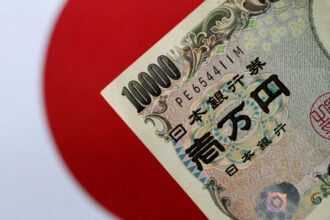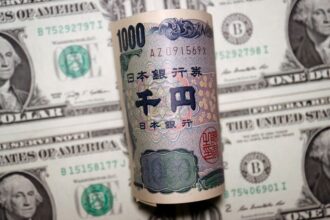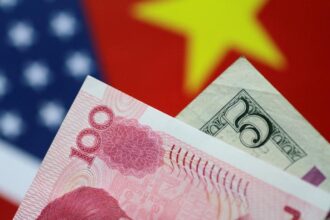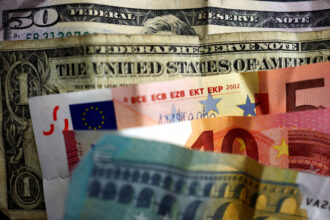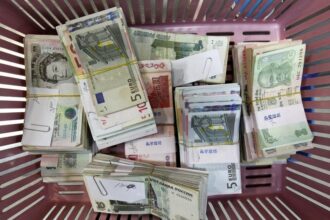By Gabriel Burin
BUENOS AIRES (Reuters) – Mexico’s peso will likely depreciate moderately in the near-term as the campaign for June’s presidential election heats up, while the central bank continues to mull over the right time to launch a rate easing cycle, a Reuters poll showed.
Since the start of the year, the currency has been trading within a close interval around 17.00 per U.S. dollar. Domestic markets have remained calm, hoping economic policies will be kept largely unchanged after the vote.
The peso is set to weaken 7% to 18.24 per dollar in 12 months’ time, from 16.96 on Monday, according to the median estimate of 20 foreign exchange strategists polled March 1-4. Forecasts ranged from 15.50 to 19.00 per dollar.
“Electoral races both in Mexico and the United States will for certain exercise pressure on the currency, but, overall, its performance will be among the best within emerging markets,” said Marcos Arias, an economist at Deloitte Mexico.
“The country benefits from strong remittance inflows and possible increases in foreign direct investment as nearshoring projects materialize,” he added, projecting the peso at 17.80 per dollar in one year.
Mexico’s presidential candidates started their campaigns on Friday for the election on June 2, with the ruling party candidate leading a race poised to crown a woman to rule Latin America’s second-largest nation for the first time.
To cement current President Andres Manuel Lopez Obrador’s legacy, his MORENA party has been targeting its efforts on obtaining a majority needed in Congress to pass constitutional reforms.
“It is unclear if any of them have a material chance of being approved in their current form, given MORENA and its allies lack the 2/3 majority needed … but it’s possible some could be ratified,” Scotiabank analysts wrote in a report.
Meanwhile, Mexico’s central bank continues to signal the possible start of a rate cut drive similar to those already in place in other countries of the region. The cost of credit currently stands at 11.25%, the highest on record.
This gives investors the opportunity to profit on a wide spread over the U.S. 5.25%-5.50% benchmark federal funds rate, which the Federal Reserve is expected to cut in June, according to another Reuters poll conducted last month.
Answering a separate question in the March foreign exchange survey, a majority of 7 of 13 economists said risks to their estimates for the Mexican peso were skewed to softer values, while 4 viewed a stronger trend, and 2 saw a neutral one.
In Brazil, the real is forecast to lose 0.8% in one year to 4.99 per dollar. The currency has shed around 2.0% of its value from the start of 2024, slightly worse than the flat performance of its Mexican counterpart so far.
(For other stories from the March Reuters foreign exchange poll:)
(Reporting and polling by Gabriel Burin in Buenos Aires; Editing by Alison Williams)
Read the full article here





